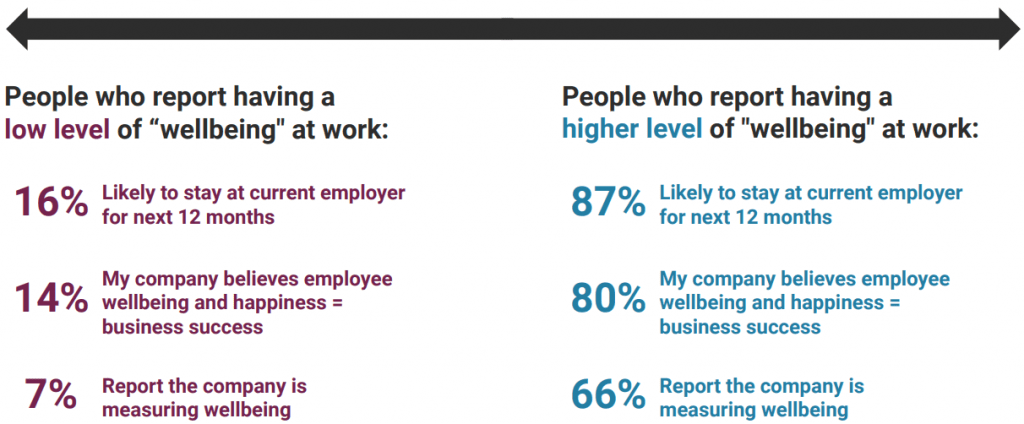Indeed recently published the 2022 Work Wellbeing Insights Report, which surveyed 5,000+ U.S. professionals to uncover what employees want from their employers and what companies can do to meet their needs. The 36-page document is full of wisdom on how employees are seeking better opportunities that enable greater well-being, and how companies can foster environments where people can thrive. Here are the highlights.
Pay is still important, but stress, dissatisfaction, and unhappiness will cause people to leave:
39% of respondents say that not being paid fairly for their work is why they look for new opportunities. Consistently feeling stressed, dissatisfied, or unhappy follow at 26%, 24%, and 20%. On the flip side, employees who feel energized and have a sense of belonging and trust are more inclined to stay in their current role. More than ever, companies must look beyond pay and ensure employees are given the tools to do their job well. This often means proper training, a healthy respect for work-life balance, and a focus on employee well-being.
Reasons People Look For New Opportunities

Work stress affects job performance and life at home; employers should care about it:
86% of employees report that work impacts their happiness at home, and the same percentage of respondents believe stress at work can significantly decrease their quality of life. The effect on job performance can be detrimental–59% report that experiencing stress at work hinders their productivity, and 56% agree that extra stress inhibits learning and growth. Combating employee stress is not just the right thing to do; it’s the smart business move to pursue.
The Impact Of Stress

Addressing stress at work takes more than offering meditation classes, as the nature of the work itself and tight deadlines are stressing employees out:
52% of respondents report that the nature of their work can be stressful (e.g., too monotonous, handling requests from customers, etc.), and 43% report often having to deal with tight deadlines. Helping employees manage anxiety at work requires addressing stress at its source, which might involve establishing realistic expectations and investing in management training to better support direct reports.
What Is Causing Stress?

Not all stress is created equal:
People with a positive stress mindset–viewing stress as a challenge to be embraced instead of something harmful, toxic, or debilitating–are 3x more likely to focus on their daily tasks, accomplish more in a short time, and be motivated to do their best at work. They are also 1.5x less likely to consider new opportunities when experiencing stress at work.
What Happens When People Are Stressed At Work?

Well-being affects every part of the employee journey–from considering the organization through the hiring process, to job performance, and whether they decide to stay:
80% of employees report it is important to see information about employee well-being programs when considering working at a company. 87% are likely to remain at their current employer for the next 12 months if they experience a high well-being level at work. Yet only 41% of respondents believe their company prioritizes employee well-being over profit. This gap creates an opportunity for leading organizations to recruit and retain talent through comprehensive wellness programs.

Measuring well-being and happiness is a good business practice:
Among those that indicate their company measures happiness and well-being, 80% are more likely to stay with their current employer for the following year. Yet only half of companies actively measure employee happiness and well-being. Measuring well-being starts with understanding its drivers and outcomes. Achievement, appreciation, belonging, inclusion, and management support are just some of the many well-being drivers that can explain why people feel happy, stressed out, or satisfied. Understanding these drivers, and nurturing them in the workplace, are good steps in supporting good well-being outcomes in employees.

Happiness at work is a shared responsibility:
While each employee is responsible for their own happiness at work, managers can also facilitate a happy work environment. 19% of respondents believe managers are responsible for their direct reports’ happiness, and 14% believe top management is responsible for the entire organization’s happiness.
Who Is Responsible For An Individual’s Happiness At Work?

Companies should leverage managers to prioritize worker well-being and foster a positive stress mindset:
Managers have the most frequent and impactful interactions with employees. Invest in developing leaders to provide them the time and space to foster an environment where teams can thrive.












